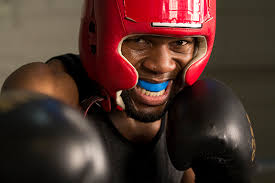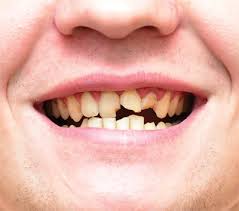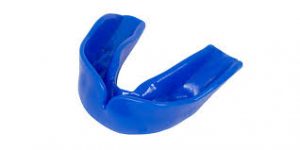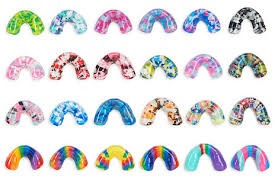The human body is pretty strong – your thigh bone is stronger than concrete! But it certainly doesn’t mean we’re invincible. Throughout the years, we’ve invented all kinds of things to protect us, from medieval knights’ armour to a modern bicycle helmet.
And your teeth are no exception. Modern technology has given rise to the mouth guard which is a fantastic dental device that protects your mouth from force and trauma.

When Do You Need It?
Mouth guards are made from flexible plastic and it is fitted over your top teeth to cushion it from any impact. It also separates your teeth from your cheeks, lips, and tongue so that you don’t accidentally bite into any soft tissue.

You should use your mouth guard whenever you’re engaging in a contact sport (i.e. situations where you risk contact/impact against players or hard surfaces). The sports that you should wear your mouth guard are:
- acrobatics
- basketball
- boxing
- discus
- field hockey
- football
- gymnastics
- handball
- ice hockey
- lacrosse
- martial arts
- racquetball
- rugby
- shot put
- skateboarding
- skiing
- skydiving
- soccer
- squash
- surfing
- volleyball
- water polo
- weight lifting
- wrestling

Mouth guards are generally for your top teeth only but for special situations, you can also get a mouth guard for your lower teeth too. Consult your dentist about the option that is right for you.
You should also definitely get fitted for a mouth guard if you’re playing sport and you’re wearing braces. Any trauma to your teeth while wearing braces may exacerbate the damage if the brackets and wires cut the soft tissue of your lips, cheeks, tongue, or gums.

Mouth guards specifically guard against your teeth being broken, chipped, damaged, or lost. But it also safeguards against many other serious injuries and situations where your lower jaw jams into your upper jaw:
- jaw fractures
- brain haemorrhaging
- concussions
- neck injuries

What Should You Look For?
When looking for an ideal mouth guard, check:
- if it fits over your teeth and in your mouth comfortably
- if you can talk and breathe properly while it’s in
- that it stays firmly in place and doesn’t move
- that it’s durable, resilient, and resistant to tearing or damage
- that it’s easy to clean (and doesn’t have weird pockets or bubbles that you find difficult to clean/rinse out)
- if there is any odour or taste to it (hint: there shouldn’t be)

There seems to be quite a lot of choice in the market and it can be confusing. What you need to know is that there are three types of mouth guards to choose from.
1. Generic
These can be purchased at any pharmacy or sport stores and online. They’re the cheapest option as they’re pre-made. Consequently, they tend to also fit pretty poorly and they’re uncomfortable to wear because they’re thick and bulky.
If you’ve bought a generic mouth guard, check it against the checklist above and to make sure it’s effective and right for you. The worst thing would be that you get onto the field and you find out you can’t breathe very well with it in or it keeps falling out.

2. Mouth-Formed
There are actually two different sub-types of mouth-formed mouth guards. Both of these are similarly available in pharmacies, sports stores, and online. They’re better fitting than generic mouth guards but they’re still quite bulky and they don’t fit as well as custom-made mouth guards. These tend to be middling in price.
Acrylic Gel
Made from acrylic gel rubber that moulds to the teeth and sets to keep its shape.
Thermoplastic
The thermoplastic piece is placed in boiling water to make it malleable, then you press and mould it around the teeth using your hands, tongue, and bite. It you don’t like how it sets, you can always just boil the thermoplastic again and reset it in your mouth.

3. Custom-Made
The most expensive option but you do get what you pay for and then some. Custom-made mouth guards are made by your dentist, who takes an impression of your top teeth and then moulds a perfect-fitting mouth guard to that impression. You then go back in and test it out to make sure any adjustments can be made for your ultimate comfort. Once you buy a great custom-made mouth guard, you never need to buy another one so it’s a worthwhile investment.

Common Complaints
With all of these benefits, it may be a bit baffling to hear that people don’t want to be wearing mouth guards. The most common and understandable complaint would be that your mouth guard is not comfortable. But if that’s the case, we cannot recommend a custom-made mouth guard enough. That will provide maximum comfort and the perfect fit.
Some kids may not find wearing mouth guards very cool (kinda like not wearing a helmet while they skateboard). Well, the dentist also has a solution to that problem. Many dentists have a variety of colours and patterns to choose from when they make mouth guards so ask your dentist their range of mouthguard plastics when you get your mouth guard custom-made.
If you find price or convenience a factor, then go for the mouth-formed mouth guards. They’re cheaper than custom-made mouth guards and you can buy them online. If you don’t like the initial fit, you can always reform the thermoplastic mouth guard until it’s comfortable for you.

